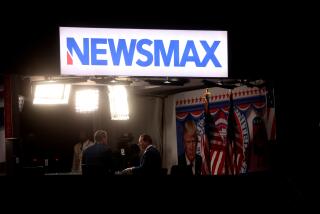On the Media: FCC takes belated action on ‘fake news’
A little-reported Federal Communications Commission action last week has put TV stations on notice: They can’t hand over airtime for commercial pitches unless they clearly label the sponsors.
The agency moved toward fining an NBC affiliate in Atlantic City, N.J., and a Fox-owned station in Minneapolis for failing to provide “sponsorship identification announcements.” The stations did not clearly tell their audiences that manufacturers were behind, respectively, glowing news segments on a cold remedy called Zicam and on a line of General Motors cars.
The good news: The action serves notice that a distracted and far-flung federal agency has not completely forgotten the dozens of instances of “fake news” — essentially commercials dressed up as editorial content — first uncovered in 2006 by a couple of public interest organizations.
The bad news: It took more than four years for the FCC to finally move on the complaints against the stations, Atlantic City’s WMGM and Minneapolis’s KMSP, even though the violations seemed self-evident from the get-go. And the proposed penalty of just $4,000 won’t do much to scare off the next station manager intent on fobbing off hucksterism as real reporting.
During a good portion of 2010, I reported on the malodorous commercial winds blowing their way into local TV news. KCBS News in Los Angeles aired segments with executives from City of Hope Medical Center that amounted to unmarked ads. KTLA Channel 5 (like The Times, owned by Tribune Co.) aired a tribute to the Ford Motor Co., with an on-screen notice to viewers so obscure that most would have had no way of knowing it was part of a Ford sponsorship deal. A so-called toy expert, meanwhile, hopscotched from one local news outlet to the next, all across America, offering on-air promos that stations often failed to identify as paid for by the toymakers.
The commercial pitches are not entirely new, but they seem to be proliferating, partly as a result of staff cutbacks at local news stations and because advertisers are desperate to find a way into the middle of programs, when their messages are less likely to be skipped by viewers with mute buttons and digital recording devices.
The FCC notices issued last week grew out of complaints filed in 2006 by Free Press and the Center for Media and Democracy — two nonprofits intent on squeezing unmarked commercial speech out of TV. The organizations identified well over 100 stations that broadcast so-called video news releases (VNRs) without notifying the public that the information came from companies with a monetary motive in the content.
The only previous action out of that pile of complaints from the nonprofits came in 2007, when the FCC proposed a $20,000 fine against Comcast and its now-defunct cable news channel CN8 for failing to appropriately label VNRs.
Ron Smith, the general manager of the NBC affiliate in New Jersey, said he was caught by surprise by the proposed fine. He noted the many other targets of the Free Press complaints have not been punished by the federal agency.
The station argued that because it was not paid by Zicam for airing its cold treatment information, it should not have to notify viewers that the glowing reviews came from the company. The FCC responded that the product was featured disproportionately, to the exclusion of information about other products and possible cold treatments. Four distinct shots of Zicam, a zinc preparation, appeared on screen during the segment.
The FCC said the action is “grounded in the principle that listeners and viewers are entitled to know who seeks to persuade them.”
Smith said that even though the station thought it was in the right it has changed its procedures and no longer airs video news releases.
The FCC hit the Minneapolis Fox station for a segment it aired in June 2006. An anchorman introduced the story, but then a GM-backed VNR took over, gushing about the resurgence of GM and its purportedly hot-selling convertibles.
“Well, think fast,” the voice-over urged. “The buzz around this year’s convertibles, many brand-new and affordable, means there may not be many left.”
After serving up that blather, the station, in its defense, laid claim to the high road — saying that the FCC had improperly intruded into its editorial decision making, thereby infringing on its 1st Amendment rights.
The last time I checked, the Constitution guarantees the right to free speech, not the right to misrepresent. As FCC lawyers correctly noted in their response, the agency wasn’t demanding that the station change one picture or a single word of the treacly little advertorial. All the agency required was a line — spoken or plastered at the bottom of the screen — that told viewers the true source of the information.
Even in last year’s Citizens United decision, in which a conservative Supreme Court majority knocked down federal restrictions on corporate campaign contributions, the court concluded that disclosure requirements don’t restrict freedom of speech, the FCC made clear.
One of the most righteous developments of the Internet Age has been the insistence by the public, and many in the press, on more transparency about the sources of information. It’s troubling to find a major media company intent on disguising the fact that its news stories are little more than regurgitated ad copy. To say the Constitution protects such a bait-and-switch is like the arrested counterfeiter saying the FBI has infringed on his artistic expression.
Twitter: latimesrainey
More to Read
The biggest entertainment stories
Get our big stories about Hollywood, film, television, music, arts, culture and more right in your inbox as soon as they publish.
You may occasionally receive promotional content from the Los Angeles Times.











